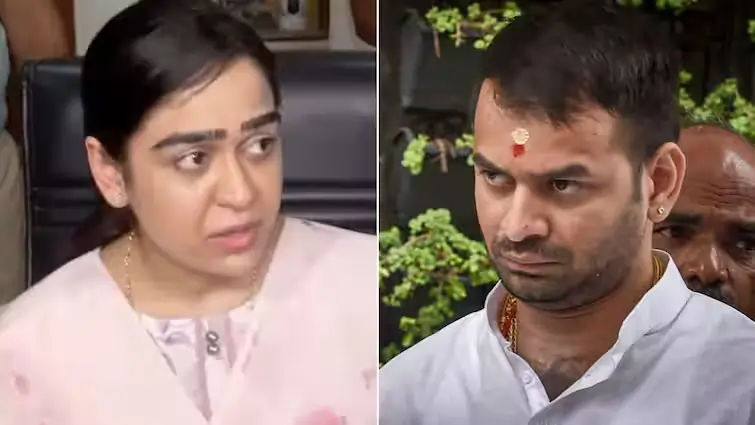
A tale of betrayal, politics, and pain—when love in a powerful family turns into a battlefield.
In a country where marriages are not just about two individuals but the union of two families—especially in political dynasties—sometimes love, choice, and personal happiness get crushed under the weight of legacy and expectations.
The ongoing divorce drama between Aishwarya Rai and Tej Pratap Yadav is one such heartbreaking story.
Aishwarya Rai, the granddaughter of former Bihar CM Daroga Prasad Rai and daughter of RJD leader Chandrika Rai, once dreamt of a life filled with love and dignity. But her reality, as she now expresses emotionally, is a far cry from that dream.
“Why was my life ruined?” she recently questioned, following another cryptic tweet from her estranged husband Tej Pratap Yadav, son of Lalu Prasad Yadav and Rabri Devi.
This question has struck a chord with many women across India—especially those whose lives are shaped more by societal expectations than personal choice.

The Political Marriage That Promised Power and Prestige
Their wedding in 2018 was nothing short of a grand alliance—politically and socially. Two influential families in Bihar united in what was expected to be a strong and stable bond.
For the outside world, it was a celebration. For Aishwarya, it marked the beginning of a struggle she never saw coming.
From the very beginning, cracks began to appear in the relationship. Within just five months of the marriage, Tej Pratap filed for divorce, citing “mental incompatibility” and saying he was forced into the marriage against his will.
“I was living a suffocated life,” he said.
Aishwarya’s Painful Revelations
While Tej Pratap tried to play the victim, it was Aishwarya’s side of the story that truly shocked the nation.
Accusing him of substance abuse, erratic behavior, and even dressing like a woman during mental breakdowns, Aishwarya painted a disturbing picture of her married life.
She claimed Tej Pratap used to dress in “ghagra-choli” and dance, claiming to be an incarnation of Lord Krishna. What seemed eccentric to some was deeply traumatic for her.
But it didn’t stop there.
Aishwarya alleged that her in-laws—Rabri Devi and her sister-in-law Misa Bharti—harassed and mentally tortured her. She said she was humiliated, locked in rooms, and eventually thrown out of her marital home.
“I Was Treated Like an Enemy, Not a Daughter-in-law”
In an emotional outburst in front of the media, Aishwarya described how she was treated worse than a servant.
“They never wanted me there. They treated me like a prisoner.”
She claimed her mother-in-law Rabri Devi and sister-in-law Misa Bharti accused her of spying and disrespected her constantly.
Despite coming from a prestigious political background herself, Aishwarya found no support, no voice, and no shelter in a house where she was supposed to feel safe.
Legal Battle for Dignity and Justice
As her personal life turned into a legal warzone, Aishwarya demanded what she believed she rightfully deserved—a secure place to stay, financial support, and dignity.
Her lawyer argued for:
- ₹1.5 lakh per month in alimony
- A decent home with proper security
- A vehicle with a driver
The court ordered Tej Pratap to provide her with accommodation and pay her rent and electricity bills. But Aishwarya’s real fight isn’t just about money—it’s about respect and acknowledgment of her suffering.
A Cry for Empathy in a Society That Often Judges Women First
Aishwarya’s story is not just about a failed marriage—it’s about the emotional trauma women endure in powerful families where image matters more than reality.
Her plea—“Why was my life ruined?”—echoes through the hearts of many Indian women who are expected to silently bear their pain to “save face.”
She was branded as “difficult,” “modern,” or “non-adjusting,” while her husband’s erratic behavior was often dismissed or hidden under the garb of mental health or spiritual eccentricity.
Tej Pratap’s Tweets: Fuel to the Fire
Instead of providing clarity or closure, Tej Pratap’s recent cryptic tweets—sometimes religious, sometimes poetic—only add to the confusion. His public display of detachment and victimhood continues to frustrate those watching this case unfold.

Each tweet seems to poke at the wound, and for Aishwarya, it feels like emotional torture played out in public.
Society’s Role: Why Are Women Always Expected to Suffer Silently?
This case raises deeper questions:
- Why is a woman’s cry for justice always doubted first?
- Why is mental health used as an excuse to avoid accountability?
- Why are powerful families often allowed to cover up abuse behind closed doors?
Despite being from a political family herself, Aishwarya found herself cornered. If this can happen to someone so well-connected and educated, imagine the plight of women who lack such privilege.
More Than a Divorce, This Is a Wake-up Call
Aishwarya Rai’s story is not just about one broken marriage—it’s a mirror reflecting the suppressed voices of thousands of women who are trapped in toxic relationships behind closed doors.
She’s not just asking, “Why was my life ruined?” She’s asking us all—society, media, and the judiciary—why women’s pain is often sidelined in the name of tradition, family honor, or politics.
The legal process continues. But the emotional damage, public humiliation, and loneliness she endured will leave scars much deeper than any court ruling can heal.
As India progresses, cases like this must push us to challenge toxic traditions, support victims, and ensure justice doesn’t come only to those with power—but to those who dare to speak the truth.

